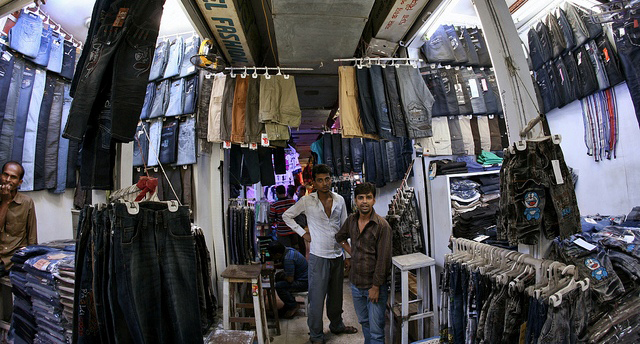Rethinking Fast Fashion
Air Date: Week of July 5, 2013

A clothing vendor in Dhaka, Bangladesh. (Photo: Adnan Islam)
Youth Radio's Bianca Brooks reconsiders her love of inexpensive fashionable clothes after a visit to a garment factory in Bangladesh.
Transcript
CURWOOD: It's Living On Earth, I'm Steve Curwood. Most topics we cover on Living on Earth relate to the environment and the natural world. And that includes human ecology and the human cost and destruction we cause with some of our choices. The collapse of a garment factory in Bangladesh this spring forces us to consider those kinds of issues. And it also made Bianca Brooks of Youth Radio rethink her love of fast fashion.
BROOKS: I love fashion. I’ve always loved it. I celebrate fashion week like it’s a holiday. But earlier this year, I realized the true cost of my trendy clothes when I met a group of women I’d been stealing from my whole life.
As part of an exchange program, I traveled eight thousand miles, from Oakland, Calif., to Dhaka, Bangladesh. On a tour of Dhaka, I visited a factory that was making clothes for some of my favorite brands. I saw hundreds of workers crowded around sewing machines and work tables. The sound of whooshing looms and the chemical smell of dye filled the air. But it was watching a young girl sewing a pair of jeans that made me feel really sick. My host sister later told me that many of these workers, mostly women and children, were living on less than $2 a day.
Suddenly, I looked at all the cute outfits I’d picked out for this trip in a completely different light. Before I'd seen the factory, I was so flattered when my new Bangladeshi friends had complimented my elegant name-brand button down. They were proud that the tag on the shirt said Bangladesh. But after, all I wanted to do was wrap my traditional Bangladeshi shawl around me to cover the shame I felt.
I’d been home from my trip for three months when I saw the horrifying headlines reporting more than a thousand people dead from a factory collapse. I know this was not the same factory I had visited, nor were these the same women or children I’d met, but I still felt close to them, and responsible somehow.
I decided to do something. To raise money and spread awareness, I organized a fashion show that featured clothes handmade by Bangladeshi craftspeople, as well as clothing manufactured in Bangladeshi sweatshops, the kind we're use to buying. People marveled at the clothes. But it wasn’t until they saw the pictures of the workers that they began to feel what I had felt – empathy and guilt.
Since I got back from Bangladesh, I haven’t purchased any sweatshop clothes... yet. I either thrift or suck it up and look for American-made brands. But it’s worth it, because there’s a hidden cost in cheap clothing. It involves someone’s livelihood, education, life and the environment. Though I will admit, it also feels better knowing companies like H&M, Tommy Hilfiger and Calvin Klein have promised to step up building improvements and safety inspections in their factories.
That way, if I’m tempted to buy something from Beyonce’s new summer line, maybe it will feel a little less like stealing.
For Living on Earth, I’m Bianca Brooks.
Links
Living on Earth wants to hear from you!
Living on Earth
62 Calef Highway, Suite 212
Lee, NH 03861
Telephone: 617-287-4121
E-mail: comments@loe.org
Newsletter [Click here]
Donate to Living on Earth!
Living on Earth is an independent media program and relies entirely on contributions from listeners and institutions supporting public service. Please donate now to preserve an independent environmental voice.
NewsletterLiving on Earth offers a weekly delivery of the show's rundown to your mailbox. Sign up for our newsletter today!
 Sailors For The Sea: Be the change you want to sea.
Sailors For The Sea: Be the change you want to sea.
 The Grantham Foundation for the Protection of the Environment: Committed to protecting and improving the health of the global environment.
The Grantham Foundation for the Protection of the Environment: Committed to protecting and improving the health of the global environment.
 Contribute to Living on Earth and receive, as our gift to you, an archival print of one of Mark Seth Lender's extraordinary wildlife photographs. Follow the link to see Mark's current collection of photographs.
Contribute to Living on Earth and receive, as our gift to you, an archival print of one of Mark Seth Lender's extraordinary wildlife photographs. Follow the link to see Mark's current collection of photographs.
 Buy a signed copy of Mark Seth Lender's book Smeagull the Seagull & support Living on Earth
Buy a signed copy of Mark Seth Lender's book Smeagull the Seagull & support Living on Earth

